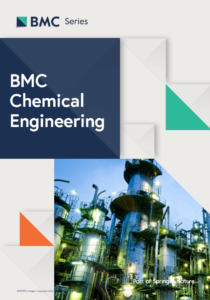
As part of Springer Nature’s dedication to advancing discovery, BMC is expanding its scope beyond biology and medicine into the physical sciences and engineering. BMC Chemical Engineering is a new, open access, peer reviewed, community journal in chemical engineering. It launches alongside another engineering title BMC Biomedical Engineering, as Editor Alex Houssein explains in his blog, and ahead of a series of other new titles to come. Both chemical engineering and biomedical engineering are fields that combine engineering concepts with core scientific principles to develop real world solutions to the benefit of humanity, an increasing focus of scientists and engineers across the globe.
Why chemical engineering?
Chemical engineering is a broad, continually evolving field that encompasses the production of, use, transformation, transportation and reuse of chemicals, biochemicals, materials and energy. This can include chemical feedstocks, fuels, agrochemicals, food, water, pharmaceuticals, materials and alternative energy sources.
This field is of particular importance as much of the research that comes under the broad scope of chemical engineering is of direct relevance to many of the global challenges that society is now facing. For example, research into desalination and water purification membranes is of vital importance for the future of a sustainable water supply across the planet. Improving the processing of cheap and efficient materials for affordable solar cells could be the solution to our future energy crisis and the development of large scale syntheses of key drugs could provide vital medicines for our growing population.
The UK government has also decided to name 2018 the “Year of Engineering”, highlighting the increasing importance of ensuring that the research we conduct directly translates to viable solutions to worldwide problems. What better time for BMC to broaden its horizons and ensure it is keeping up with the ever progressing research community?
BMC – Research in Progress

BMC Chemical Engineering joins the 65+ journals that are part of the BMC Series. Based on the inclusive ethos of these journals, BMC Chemical Engineering is a broad scope journal, which will
consider fundamental and applied papers in any branch of chemical engineering. It will not make editorial decisions based on the likely impact of the work, rather on the scientific validity following rigorous, yet efficient, peer review. The journal is supported by a strong, international Editorial Board led by Professor Sang Yup Lee (KAIST) and is divided into the following 6 sections:
- Process design, optimization and intensification
- Reaction engineering and catalysis
- Transport phenomena
- Separation and purification processes
- Plant design, management and control
- Sustainable chemical and biochemical processes
In line with the BMC Series ethos, all content in the journal will be fully open access and making data associated with a manuscript freely accessible online will also be highly encouraged. Open research and open data are core values of BMC, and we believe this openness is crucial for the rapid advancement of science and engineering.
BMC Chemical Engineering is now open to submissions and we invite you to take a look at the website for the full aims and scope, the Editorial Board and for details on how to submit. Feel free to contact me directly at harriet.manning@springernature.com for further information.
BMC Chemical Engineering will be present both at the Fall ACS 2018 (19-23 August, Boston, MA) and the 2018 AIChE Annual Meeting (28 October – 2 November, Pittsburgh, PA) so if you are attending, do come and talk to us about this new venture. We hope that you will consider publishing your research open access with us!
Comments